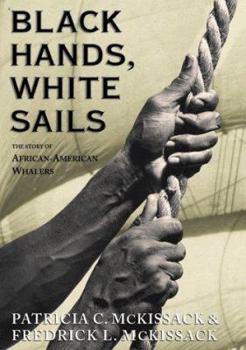Black Hands, White Sails
Select Format
Select Condition 
Book Overview
During colonial times, the whaling industry developed along the eastern coast. Nantucket and New Bedford, Massachusetts, were the centers where ships were built and outfitted, and where they returned laden with their precious cargo. These whaling ships supplied 80% of the oil used by Americans for well over a century.Because whaling was so dangerous, captains and crews of the whaling boats set themselves apart from ordinary seamen. Despite the challenges of the sea, runaway slaves we eager to enlist; they were used to hard work and willing to accept lower pay than other sailors. Free black seamen signed on because of the career opportunities; one day they might be a first mate, a captain, or even an owner. Additionally, there was less prejudice onboard a whale ship than on land because everyone had to cooperate for the common good of all. As one black seaman wrote, "The sea was an equalizer of men, therefore the captain chose his crew based on who could do the job best."This book details the lives of such well-known figures as Paul Cuffee, ship owner and captain; Crispus Attucks, a whaleman killed in the Boston Massacre; Fredrick Douglass, a leading abolitionist who was once a caulker of ships in New Bedford harbor; Joe Hershey, a well-known ships' blacksmith; and Lewis Temple, who invented the toggle harpoon. Information on lesser known individuals is also included. Readers will follow a complete voyage of a whale ship, from signing on at the docks, to the hunt, and the return home.
Format:Hardcover
Language:English
ISBN:0590483137
ISBN13:9780590483131
Release Date:October 1999
Publisher:Scholastic Press
Length:160 Pages
Weight:0.79 lbs.
Dimensions:0.9" x 5.8" x 8.6"
Age Range:8 to 13 years
Grade Range:Grades 3 to 8
Customer Reviews
2 ratings
New Bedford's untold history
Published by Thriftbooks.com User , 23 years ago
This book is indeed a must read and should be made a prerequisite for all that read Moby Dick. I found this book to be a riveting account of whaling and the importance that people of color visited upon this industry. I was very much overcome with emotions with every turn of the page as I learned how many of my ancestors came to live in New Bedford, MA and what they must have endured.
Must Read for black historians and Whale buffs.
Published by Thriftbooks.com User , 24 years ago
This book is a must read for black historians, civil war historians, and whale experts, which I am. I was completely unaware of the presence and dynamics of the life of black whalers. The serious risks of whaling far outweighed the risks of abduction by slave patrollers or even a life burdened by segregation and discrimination. I was particularily interested in the use and abuse of whale ships in the Civil war. A stone fleet of 15 whaling ships from the North were loaded with stones and sunk in Charleston harbor in an attempt to block the harbor in 1861. The attempt failed because the waters were too deep. Sountherners then became hell bent on destroying whale boats. The Confederate steamer Alabama sunk over 70 whale boats during the war. The Shenandoah sunk 34 more after the war. Black heroes and self made men are hailed, as well as those who were cannibalized by hungry crew in desparate times. I couldn't put this book down.





